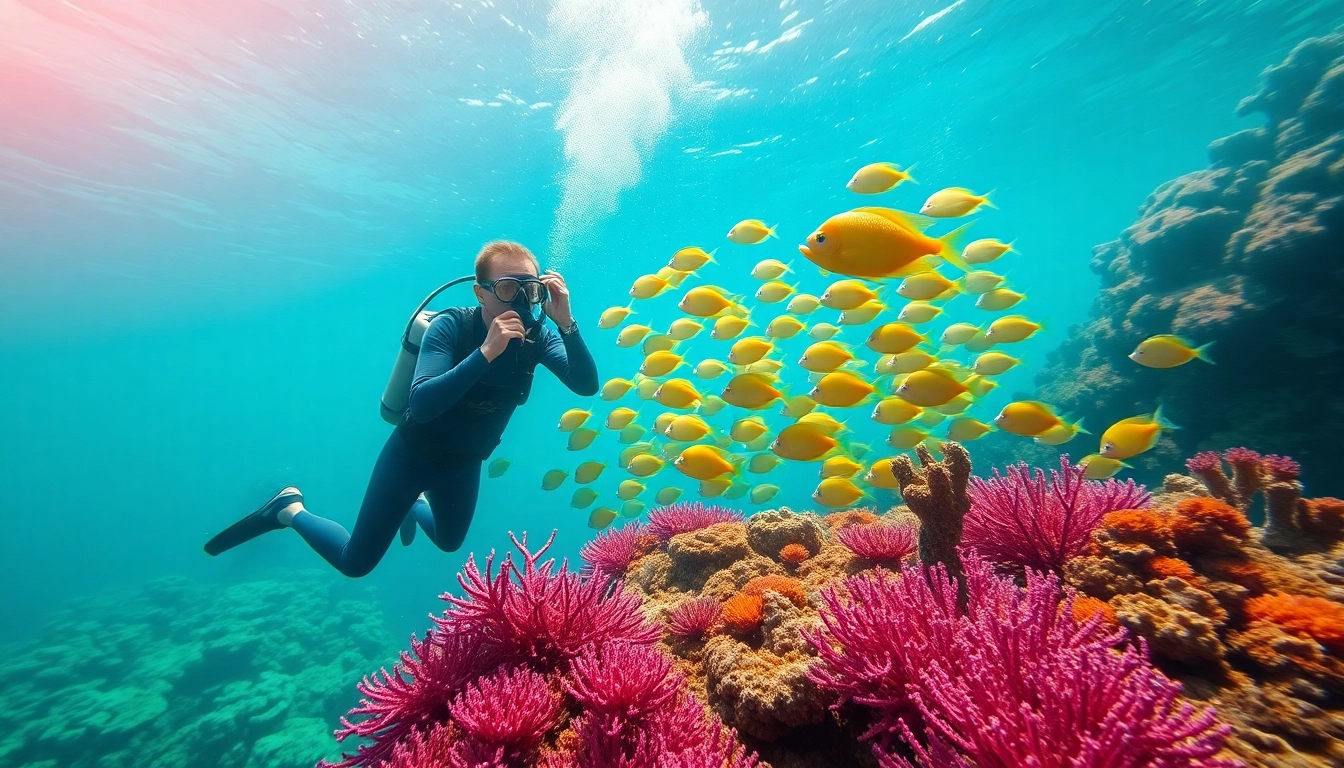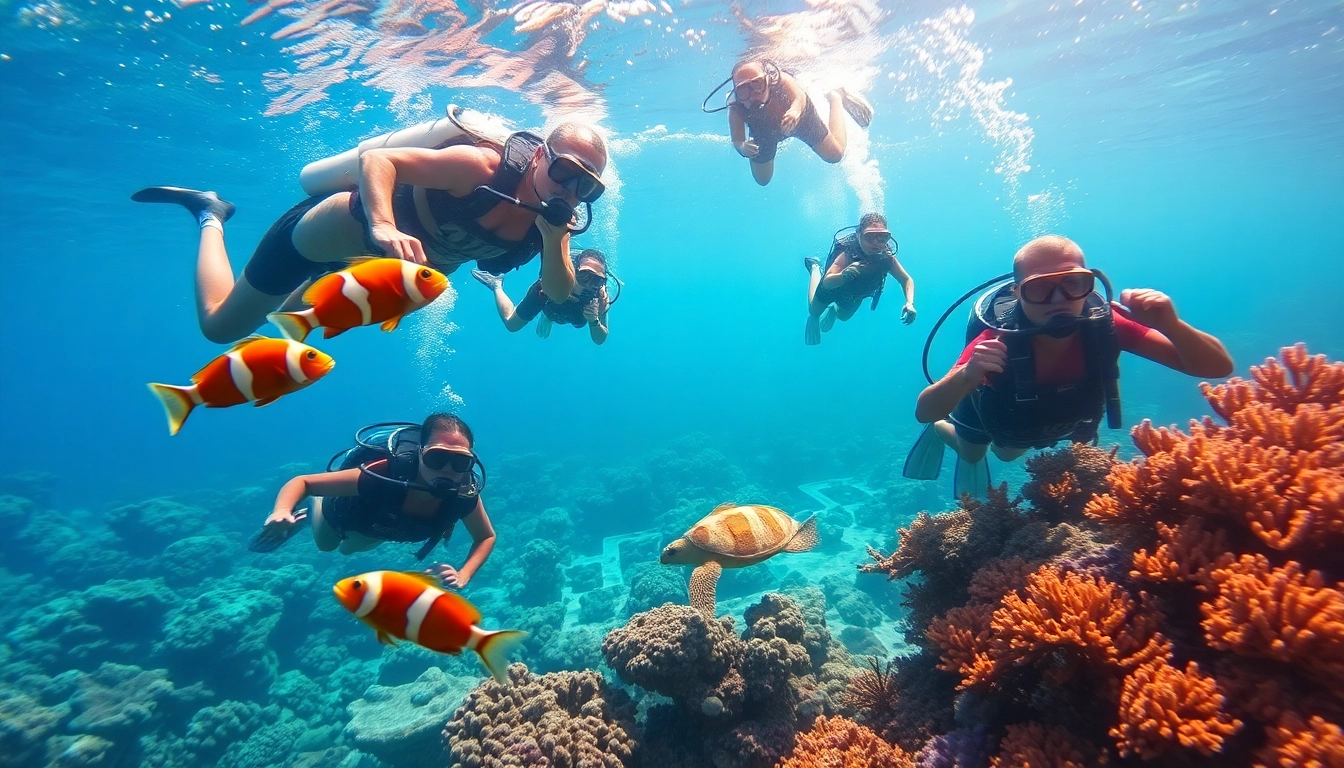The Allure of Bali Diving
Bali, often dubbed the Island of the Gods, is not only known for its picturesque landscapes, vibrant culture, and spiritual heritage, but it is also a paradise for divers. The crystal-clear waters of Bali boast a rich marine ecosystem, making it one of the premier diving destinations in the world. Whether you’re an experienced diver or a beginner eager to take your first plunge, the opportunities for Bali Diving are abundant and varied.
Understanding Bali’s Unique Marine Ecosystem
Bali’s marine biodiversity is unparalleled. The waters surrounding the island are home to an array of ecosystems, from vibrant coral reefs to intricate underwater topographies. The coral reefs in Bali are not just beautiful; they are crucial for the survival of many marine species. These reefs serve as breeding grounds for fishes and are vital for overall marine life health. Additionally, Bali’s waters are connected to the Coral Triangle, known as the global center of marine biodiversity.
This unique marine environment attracts a plethora of marine life, including colorful fish, majestic manta rays, and even the elusive mola mola (ocean sunfish). Each diving site in Bali offers a different experience; some are renowned for their vibrant coral gardens, while others are celebrated for historical wreck dives and unique underwater geological structures.
Popular Dive Sites in Bali Diving
Bali offers a wide range of dive sites, each with its own unique characteristics and attractions. Here are some of the most popular spots:
- Tulamben: Famous for the USAT Liberty shipwreck, Tulamben is a must-visit for wreck diving enthusiasts. The wreck sits in shallow waters, making it accessible for divers of all levels and teems with marine life.
- Nusa Penida: This area is known for its dramatic underwater topography and is an excellent spot for seeing manta rays and mola molas, particularly during the right seasons.
- Amed: A quieter alternative, Amed features beautiful coral gardens and calm waters, making it great for snorkeling and underwater photography.
- Paduangbai: A favored site for divers seeking vibrant coral reefs and diverse marine life. It is also an exceptional spot for drift diving.
- Menjangan Island: Part of the West Bali National Park, Menjangan Island offers stunning wall dives and pristine coral ecosystems untouched by mass tourism.
Bali Diving for Beginners: Getting Started
For those looking to embark on their diving adventures, Bali provides an array of opportunities for beginners to get certified. Many dive centers offer courses led by experienced instructors who are well-versed in safety protocols and best diving practices.
Beginners can start with introductory courses such as Discover Scuba Diving, where they can experience diving in a controlled environment, often in shallow waters that are safe and accessible. Once comfortable, they can progress to open water certification courses that cover essential diving skills and knowledge essential for safe diving.
Preparing for Your Bali Diving Adventure
Essential Gear for Bali Diving
Having the right gear is crucial for a successful diving experience. Essential items include:
- Wetsuit: Depending on the time of year, a wetsuit can protect against cold water temperatures and minor abrasions.
- Mask, Snorkel, and Fins: Essential for visibility and ease of movement underwater.
- Buoyancy Control Device (BCD): A vital piece of equipment that helps divers maintain neutral buoyancy.
- Regulator: This device allows divers to breathe air from the tank.
- Dive Computer: Essential for tracking depth and time underwater, as well as ensuring dive safety.
Divers can either rent or purchase equipment, but beginners are often advised to rent gear at first to determine their preferences before investing in high-quality diving equipment.
Health and Safety Tips for Bali Diving
Safety should always be a top priority when diving. Here are crucial health and safety tips:
- Stay Hydrated: Hydration is key before and after dives to avoid decompression sickness.
- Know Your Limits: Always dive within your skill level and do not attempt to dive deeper or longer than you are trained to handle.
- Buddy System: Always dive with a buddy to ensure safety and support in emergencies.
- Pre-Dive Checks: Conduct thorough gear checks and discuss dive plans with your buddy or instructor.
- Listen to Your Body: If you feel unwell or uneasy at any point, communicate with your dive leader and possibly refrain from diving.
Choosing the Right Instructor for Bali Diving
Selecting the right dive instructor or center is a must for a rewarding experience. Look for:
- Certification: Ensure that instructors are certified and qualified by recognized organizations.
- Experience: Look for instructors with ample diving experience and a good knowledge of local dive sites.
- Customer Reviews: Check online reviews and ask for recommendations to find reputable dive schools with positive feedback from past divers.
- Safety Protocols: Inquire about their safety standards and emergency protocols.
- Small Group Sizes: Ideal for personalized attention and tailored instruction.
Seasonal Insights for Bali Diving
Best Times for Bali Diving Adventures
The diving season in Bali is determined by the weather and ocean conditions. Typically, the best diving can be found from April to November when visibility is at its peak and the waters are calm. However, this can vary slightly based on regional differences around the island.
During these months, divers can enjoy optimal underwater visibility, making it a great time to capture stunning underwater photographs and witness the unique marine life that inhabits Bali’s waters.
Weather Considerations for Bali Diving
Bali has a tropical climate with a wet season usually from December to March. While diving during the wet season is still possible, conditions can be less predictable, with strong currents and reduced visibility in some areas. Before planning your Bali Diving experience, it’s advisable to check local weather reports and dive center recommendations to ensure safe opportunities.
Marine Life Spotting Seasons in Bali Diving
Different times of the year also influence marine life visibility. For example:
- Manta Rays: Generally seen from May to September, particularly around Nusa Penida.
- Mola Mola: Best spotted from July to October during the colder water months when they come up from deeper waters.
- Coral Spawning: Usually occurs in the full moon of the months of May or June, attracting various marine species.
Being aware of these seasonal patterns can significantly enhance divers’ experiences as they can plan their dives for optimal wildlife encounters.
Advanced Bali Diving Techniques
Technical Diving Opportunities in Bali Diving
For advanced divers, Bali offers opportunities for technical diving, which involves diving beyond normal recreational limits to explore deeper waters, caves, or wrecks. Technical diving requires specialized training and equipment, such as mixed gas tanks and advanced decompression techniques.
Some popular technical diving sites in Bali include:
- Tepekong and Manta Point: Known for strong currents and beautiful underwater landscapes, attracting experienced divers.
- Liberty Wreck: While accessible to beginners, sections of the wreck can also be explored by advanced divers.
It is critical for technical divers to undergo proper training and to dive with experienced teams that prioritize safety protocols.
Night Diving Experiences in Bali Diving
Night diving in Bali reveals a completely different perspective of the underwater world. Many marine species are nocturnal and are active at night, providing divers a unique chance to encounter creatures and behaviors not visible during the day.
Popular night dive sites include:
- Padang Bai: Known for its vibrant night life, divers often see shrimp, octopus, and various species of fish.
- Tulamben: The Liberty wreck transformed at night into a charming underwater wonderland with bioluminescent organisms illuminating the surroundings.
For night dives, it’s crucial to have a reliable dive light besides being accompanied by an experienced guide to ensure safety and enhance enjoyment.
Underwater Photography Tips for Bali Diving
Bali is a photographer’s dream, offering stunning underwater landscapes and a vibrant array of marine life. Here are some tips for capturing the best shots:
- Use Natural Light: Dive during midday when the sun is high for better visibility and vibrancy in colors.
- Stabilize Your Camera: Use strobe lights to reduce backscatter and maintain image quality; consider using them judiciously for close-ups.
- Get Close: The underwater environment can distort images; get as close as possible to your subject for better shots.
- Practice: Familiarize yourself with your camera underwater before capturing important moments to avoid missing opportunities.
- Respect Marine Life: Ensure you don’t disturb the environment or creatures while photographing, maintaining safety for both yourself and marine life.
Finding Your Bali Diving Community
Connecting with Local Diving Schools
One of the best ways to immerse yourself in the Bali diving community is to connect with local dive schools and instructors. These organizations not only provide diving certifications but also offer social events, guided dives, and networking opportunities with other diving enthusiasts.
Participating in group dives can be a rewarding experience, providing the opportunity to meet locals and fellow divers. This sense of community can enhance the overall diving experience, creating lasting friendships and dive companions.
Online Forums and Resources for Bali Diving
Diving forums and online communities are excellent resources for sharing experiences, asking questions, and finding dive buddies. Popular platforms include:
- Scuba Forums: Websites like ScubaBoard and Reddit’s scuba community where divers of all levels exchange advice and experiences.
- Social Media Groups: Facebook groups dedicated to diving in Bali are vibrant with photos, stories, and advice.
- Blogs and Vlogs: Many divers share their adventures and tips through personal blogs and video content, offering insights into local conditions and dive sites.
Participating in Bali Diving Events and Competitions
Bali hosts numerous diving events and competitions, providing divers with opportunities to showcase their skills and engage with the community. Participating in these events not only enhances diving skills but also promotes conservation efforts and marine life protection initiatives. Look out for:
- Dive Competitions: Events where divers can compete in categories such as underwater photography and free diving.
- Marine Conservation Clean-Up Dives: Collaborate with local organizations to keep Bali’s waters pristine while diving.
- Workshops and Seminars: Educational opportunities that deepen understanding of marine ecosystems and diving techniques.



